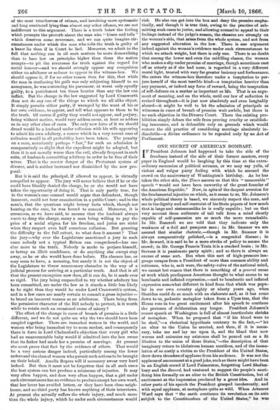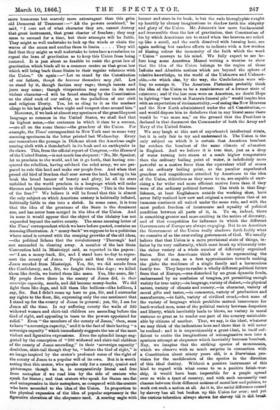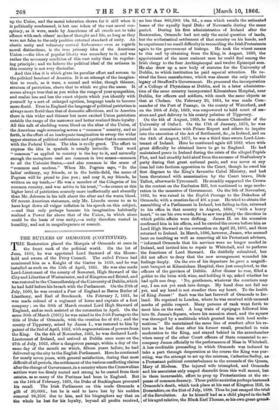ONE SECRET OF AMERICAN BOMBAST.
IT President Johnson had happened to take the side of the • freedmen instead of the side of their former masters, every paper in England would be laughing by this time at the extra- ordinary succession of political screams, or we may say yells, of violent and vulgar party feeling with which he amused the crowd on the anniversary of Washington's birthday. As he has taken the other side, the Times assures us that this " memorable" speech " would not have been unworthy of the great founder of the American Republic." Now, in spite of the deepest aversion for the fundamental injustice on which, as it seems to us, Mr. Johnson's whole political theory is based, we sincerely respect the man, and see in the dignity and self-restraint of his State papers of how much that is large and statesmanlike he is really capable ; but on that very account these outbursts of tall talk from a mind clearly capable of self-possession are so much the more remarkable. In Mr. Bancroft we are told that they indicate only the weakness of a dull and pompous man ; in Mr. Sumner we are assured that similar rhetoric,—though in Mr. Sumner it is always comparatively polished,—is a congenital disease ; in Mr. Seward, it is said to be a mere stroke of policy to amuse the crowd ; in Mr. George Francis Train it is a cracked brain ; in Mr. Stevens it is passionate party spirit ; and so there is always an excuse of some sort. But when this sort of high-pressure lan- guage escapes from a President of more than common ability and reticence, who is, as it were, the safety-valve of the national mind, we cannot but reason that there is something of a general cause at work which predisposes American thought to what seems to us bombastic and inflated expression,—and to bombastic and inflated expression somewhat different in kind from that which was popu- lar in our own country eighty or ninety years ago, when Sheridan could do so much with an elaborate and, as it has come down to us, pedantic metaphor taken from a Upas tree, that the House rose in too great excitement after his speech to continue the pretence of deliberation any longer. President Johnson's recent speech at Washington is full of almost inarticulate shrieks of metaphor. When he proposed that " if his blood were to be shed,"—a rhetorical hypothesis contrary to the fact,—" let an altar to the Union be erected, and then, if it is neces- sary, take me and lay me upon it, and the blood that now warms and animates my existence shall be poured out as a fit libation to the union of these States,"—the description of that imaginary return to idolatrous human sacrifices, and of the immo- lation of so costly a victim as the President of the United States, drew down thunders of applause from his audience. It was not the applause of amusement at a good joke, such as there might have been in an English crowd if Lord Palmerston, forgetting Lord Shaftes- bury and the Record, had ventured to suggest the people's sacri- ficing him formally on an altar to the British Constitution, but of excitement at the impression produced by a great idea. And in other parts of his speech the President grasped incoherently, and with equal applause, at metaphors quite as wild. When Artemus Ward says that " the earth continues its revolution on its axis subjick to the Constitooshun of the United States," he was
more humorous but scarcely more extravagant than this grim old Democrat of Tennessee :—" All the powers combined," he said, " I care not of what character they are, cannot destroy that great instrument, that great charter of freedom ; they may seem to succeed for a time, but their attempts will be futile. They might as well undertake to lock up the winds or chain the waves of the ocean and confine them to limits They will find that they might as well undertake to introduce &resolution to repeal the laws of gravitation as to keep this Union from being restored. It is just about as feasible to resist the great law of gravitation which binds all to a common centre as that great law which will bring back these States to their regular relations with the Union." Or again :—" Let us stand by the Constitution of our fathers, though the heavens themselves may fail. Let us stand by it, though faction may rage ; though taunts and jeers may come ; though vituperation may come iu its most violent character—I will be found standing by the Constitution as the chief rock of our safety, as the palladium of our civil and religious liberty. Yes, let us cling to it as the mariner "clings to his last plank when night and tempest close around him."
Moreover, if we look at almost any specimen of the grandiloquent language so common in the United States, we shall find that its highest notes,—the sentences in which it rises to a scream, —are all on the same theme—the grandeur of the Union. For "example, the Times' correspondent in New York sent us some very -amusing specimens in the letter printed last Wednesday. Every one remembers the passage in Dickens about the American eagle soaring aloft with a thunderbolt in its beak and an earthquake in its claws. This, from the official report of Congress,--the Hansard of the United States,—is not much less eloquent: "No, Mr. Speaker, let us proclaim to the world, and let it go forth, that having con- atnered the rebellion, having subdued the rebel army, we are pre- pared to rule this land and make our people free. And when that proud old bird of freedom shall soar across the land, bearing in his beak the broad banner of beauty and glory; let all its stars unfolded to the world proclaim in a language which will make thrones and tyrannies tremble to their centres, This is the home of the free !" We believe it will be found that this is almost the only subject on which American oratory is habitually inflated, habitually liable to rise into a shriek. In some cases, it is true that the idea of the greatness of the State is the dominant one, and has never been merged in the idea of the Union. And in some it would appear that the object of the idolatry has not expanded beyond the native county. The same amusing letter of the Times' correspondent which we have before quoted, contains an .aniu.sing illustration. A " mossy-back" we suppose to be a politician whose mind is covered with the creeping growths of the old ideas, —the political lichens that the revolutionary Thorough' had riot succeeded in clearing away. A member of the last State Convention held in Mississippi said, as reported in the papers : —"I am a mossy-back, Sir, and I stand here to-day to repre- sent the county of Jones. People said that the county of Jones seceded from Mississippi Yes, Sir, we did secede from the Confederacy, and, Sir, we fought them like dogs ; we killed them like devils, we buried them like asses. Yea, like asses, Sir ! My people down there in the county of Jones did, in their sovereign capacity, secede, and did become mossy-backs. We did fight them like dogs, and kill them like hellions—like hellions, I say, Sir. But I didn't come up here to gas, Sir, and I surrender any rights to the floor, Sir, expressing only the one sentiment that I stand up for the county of Jones in general ; yes, Sir, I am for Jones all the time. In my suffering county the wails of 380 widowed women and shirt-tail children are ascending before the God of right, and appealing in tears to the powers appointed for relief." Even " the members of the county of Jones," then, seem to have "a sovereign capacity," and it is the fact of their having " a sovereign capacity " which immediately suggests the use of the most violent and figurative expressions. Even the splendid image sug- gested by the conception of "380 widowed and shirt-tail children of the county of Jones ascending," in their 'sovereign capacity' doubtless, shirt-tail though they be, "before the God of right," is an image inspired by the orator's profound sense of the right of the county of Jones to a popular will of its own. But it is worth noting that this orator, who speaks only for a county, quaint and picturesque though he is, is comparatively literal and free from metaphor if we read him by the side of orators who speak for States ; and that orators who speak for States are flat and unimpressive in their metaphors, as compared with the orators who have ascended to the idea, of the Union. In proportion to the physical expansion of the idea of popular supremacy is the -figurative elevation of the eloquence used. A soaring eagle with
banner and stars in its beak, is but the rade hieroglyphic caught up heartily by clumsy imaginations to shadow forth the ubiquity and glory of the Union. Mr. Johnson's law more fandanreatel and irreversible than the law of gravitation, that Constitution of his by which Americans are to stand when the heavens are rolled
up like a scroll, and the earth dissolved with barning heat, are again nothing but random efforts to indicate with a few strokes of blazing colour the immensity of the faith which the word " Union " conveys to his mind. We fully expect to see be- fore long some American Mansel writing a treatise to show that the idea of the Union belongs to the region of those Infinite and Absolute notions which are beyond the sphere of relative knowledge, to the world of the Unknown and Unknow- able,—to which also, by the way, the Confederates were wil- ling to consign it. The American Platonists probably think the idea of ties Union to be a reminiscence of a former state of existence ; and if the last man were an American, no doubt Hope in lighting "her torch at Nature's funeral pile" would inspire him with an expectation of its immortality,—of seeing the New Heavens and the New E trth administered under the old Constitution,— and would dispose him to disbelieve that in any literal sense there would be "no more sea," on the ground that the President is declared in that document the Commander of both the Army and Navy of the United States.
We may laugh at this sort of superheated intellectual strain, but it is only fair to try and understand it. The Union is the only subject on which it is certain that American bombast far outdoes the bombast of the same climate of education in England. And we believe it is true that, just as a drop of water turning into steam at a mach higher temperature than the ordinary boiling point of water, is indefinitely more powerful as a motive force than the equivalent whiff of steam at the ordinary boiling point, so the peculiar superheated grandeur and magnificence attached by Americans to the idea of the Union, ridiculous as they seem to us, are capable of exer- cising a far wider and more efficient motive force than if they were of the ordinary political fervour. The. truth is that Eng- lishmen, at least Englishmen outside the working class, have never fully realized how new and original a conception that of an immense continent all united under the same rule, and with the most perfect freedom of intercourse and equality of political condition between all parts of it, is. To us, indeed, there is something-greater and more exciting in the notion of diversity, and of that competition for influence in which the different Governments of Europe are always engaging. But to an American the Government of the Union really shadows forth feebly what we conceive of as the over-ruling government of God. We usually believe that that Union is a mere provisional state of things, in- ferior by its very uniformity, which must break up ultimately into the richer variety of a whole number of differently organized States. But the Americana think of it as representing the true unity of man, as a first approximation towards making the globe the residence of a single family and a harmonious family too. They hope to realize a wholly different political future from that of Europe,—one disturbed by no great dynastic feuds, embarrassed by no confusion of toaguea, yet permitting enough variety for true unity;—in language, variety of dialect,—in physical nature, variety of climate and scenery.—in character, variety of moral gifts and tastes,—in commerce, variety of production and manufacture,—in faith, variety of civilized creed,—but none of the variety of language which prohibits mutual intercourse for hard-worked men, none of the political variety between despotism and liberty, which inevitably leada to blows, no variety in moral customs so great as to render one part of the country uninhabit- able by citizens of another. That, we say, is the ideal, whatever we may think of the indications here and there that it will never be realized : and it is unquestionably a great ideal, in itself suf- ficient to excite the imaginations, of unimaginative men into a spurious attempt at eloquence which inevitably becomes bombast. Nay, we imagine that the striking species of monomania, which we observe with so much surprise in connection with a Constitution about ninety years old, is a Darwinian pro- vision for the modification of the species in the direction of this ideal destiny. Without a positive instrument of this kind to regard with what/ seems to us a positive fetish-wor- ship, it would have been impossible for a people spread over so wide a tract of country, and with such necessarily vast chasms between their different notions of moral law and politics, to work out such a notion at all. As it is, the social difference caused
by slavery has all but broken up this Union for ever; did yet the curious toleration always shown for slavery till it dui break up the Union, and the moral toleration shown for it still when it is politically condemned, is but one token of the vast moral con- spiracy, as it were, made by Americans of all creeds not to take offence with each others' modes of thought and life, so long as they were not false to the only positive external standard of unity. An elastic unity and voluntary mutual forbearance even as regards moral distinctions, is the true primary idea of the American Union :—the idea of popular liberty was secondary to it, and was rather the necessary condition of this vast unity than its regulat- ing principle ; and we believe the political ideal of the artisans in this country is not very dissimilar.
And this idea it is which gives its peculiar effort and scream to the political bombast of America. It is an attempt of the imagina- tion to reach, as it were, a second and wider, though thinner, stratum of patriotism, above that to which we give the name. It seems always true that as you widen the range of your sympathies, and realize less and less the exact objects which you identify with yourself by a sort of enlarged egotism, language tends to become more florid. Even in England the language of political patriotism is always more florid than that of domestic affections, and in America there is this wider and thinner but more excited Union patriotism outside the range of the narrower and better realized State loyalty. All this talk of shedding warm blood on the altar of the Union, of the American eagle screaming across a " common " country, and so forth, is the effort of an inadequate imagination to sweep the wider upper stratum of political enthusiasm and egotism that is connected with the Federal Union. The idea is really great. The effort to express the idea in symbols is usually imbecile. That word " common" as applied to country is the key to it, and naturally enough the metaphors used are common in two senses—common to all the Unionist States,—and also common in the sense of " common and unclean." When Mr. Pogram says, " In the ladies' ordinary, my friends, or in the battle-field, the name of Pogram will be proud to jine you ; and may it, my friends, be written on my tomb,—' He was a member of the Congress of his common country, and was active in his trust,' "—he cranes at this higher level of patriotism scarcely more ineffectually and absurdly than Mr. Johnson in his talk about the altar and the warm blood. Of recent American statesmen, only Mr. Lincoln seems to us to have kept down all vulgar inflation in his speech on this subject, —and that only perhaps because his imagination habitually realized a Power far above that of the Union, in which alone could be the basis of true unity,—a unity therefore rooted in humility, and not in magniloquence or conceit.
































 Previous page
Previous page